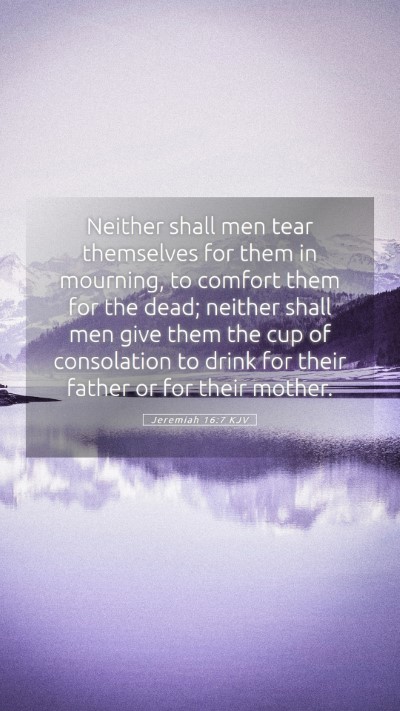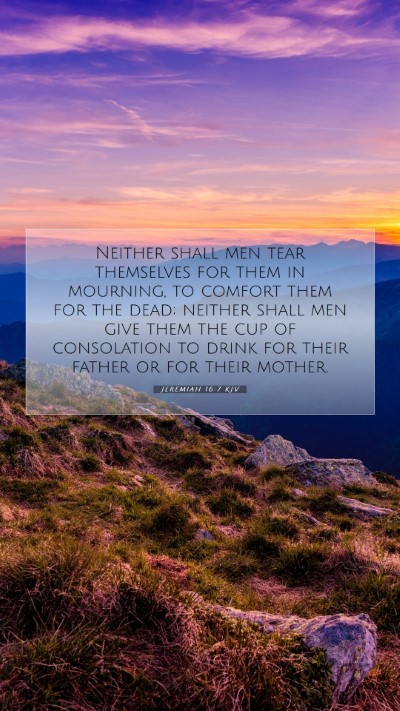Understanding Jeremiah 16:7
In this exploration of Jeremiah 16:7, we seek to provide a comprehensive understanding of the verse through the insights of renowned public domain commentaries. This analysis is invaluable for those engaged in Bible study, striving for a deeper comprehension of Scripture.
Verse Context
Jeremiah, often referred to as the weeping prophet, conveys God’s message during a tumultuous time for Israel. Jeremiah 16:7 states:
"Neither shall men tear themselves for them, nor make themselves bald for them." (KJV)
Commentary Insights
This verse reflects a moment of mourning, yet Jeremiah delivers a divine message that calls for a change in the practices of the people. Let us delve into the interpretations provided by notable commentators.
Matthew Henry’s Commentary
Matthew Henry emphasizes that the absence of mourning is an indication of God’s judgment upon the people. He suggests that traditional mourning practices, such as tearing of garments and baldness, signify desperation and sorrow over loss. Henry urges readers to reflect on how God’s judgment leads to a cessation of such mourning among the community, as there was little hope left for the nation. This understanding can be applied in Bible study groups as a reminder of the seriousness of sin and divine justice.
Albert Barnes’ Notes on the Bible
Albert Barnes interprets this verse in the context of a prophetic warning. He notes that the absence of public mourning reflects a change in the spiritual landscape of Israel, where the people would no longer engage in practices demonstrating their grief for the sin leading to exile. Barnes encourages readers to grasp the real implications of this transformation. It serves as a profound lesson on the significance of mourning for personal sin and collective transgressions – pivotal concepts in understanding Scripture.
Adam Clarke’s Commentary
Adam Clarke elucidates the deeper meaning of the mourning practices mentioned in Jeremiah 16:7. He indicates that such practices were a significant part of Jewish tradition, symbolizing grief and loss. Clarke’s exposition reinforces the idea of removing these customs as further judgment from God. By examining these traditions, Clarke facilitates Bible study insights into the cultural and spiritual ramifications for the people of Israel, encouraging a modern-day application regarding the seriousness of sin and the need for repentance.
Application of This Verse
The essence of Jeremiah 16:7 transcends its immediate context and invites several Bible study lessons:
- **The seriousness of sin**: Understanding that sin brings about divine consequences.
- **The role of mourning**: Reflecting on how we respond to spiritual loss or disconnection from God.
- **Cultural significance**: Acknowledging how cultural practices influence our spiritual expression.
Cross References
To further enrich the understanding of Jeremiah 16:7, consider the following related passages:
- Jeremiah 9:17-20 - This passage addresses the call to mourning for the people of Israel.
- Ezekiel 24:17 - Discusses the expected mourning in response to God’s judgments.
- Revelation 18:17 - Reflects on the mourning after God’s decisive actions against sin.
Conclusion
In conclusion, Jeremiah 16:7 offers rich layers of meaning within its teachings on mourning, judgment, and cultural practices. By studying this verse, individuals gain invaluable insights applicable in both historical and contemporary contexts about the nature of sin and the import of personal and communal responses. Engaging with this verse through various Bible study tools can deepen understanding and enrich spiritual growth.


